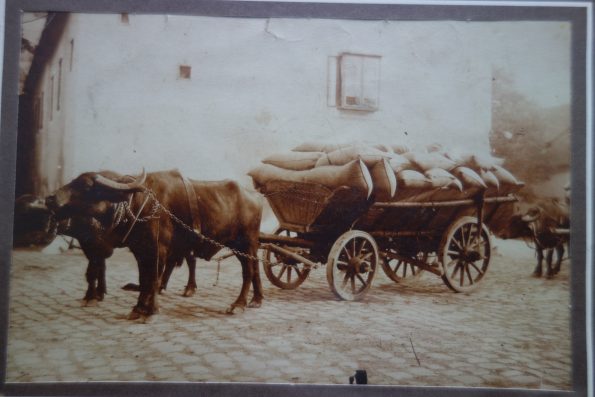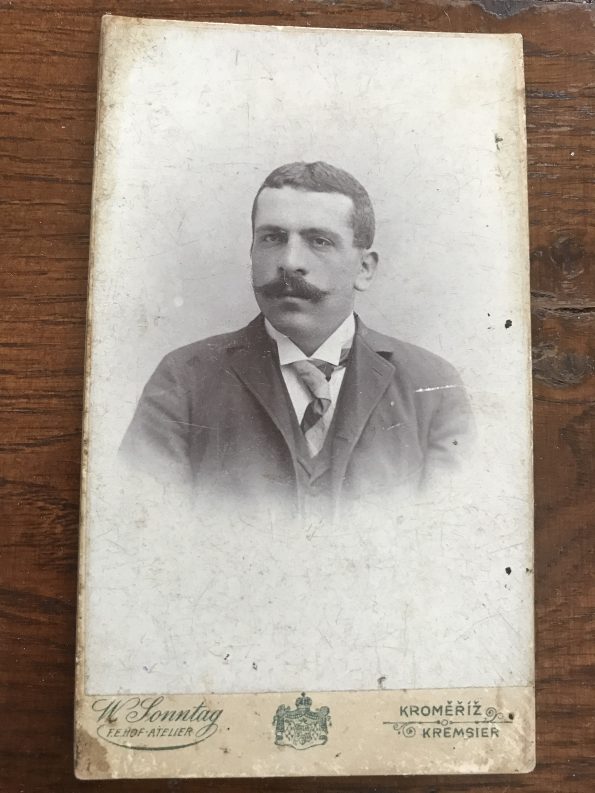THE CAREER AS A BEER BREWER IN VIENNA AROUND 1900

Oxen cart in front of the brewery in Kaiser Ebersdorf Vienna
My great-grandfather, Ignaz Sobotka, was born in Vienna, Ober Laa, in 1872 and his father Josef Sobotka, ran one of the cellars of the brewery “Hütteldorfer Brauerei” in Breitensee. Ignaz learned the trade of a beer brewer as an apprentice in Mährisch Budwitz (Moravské Budějovice, today Czech Republic) with the brewer Moritz Fried, who was probably a relative of his mother Sali Sobotka, née Fried. He completed his apprenticeship in 1890 and then gained experience as a travelling brewer staying at different breweries in the Austro-Hungarian Empire for approximately one year each. In the monarchy this working expertise of a travelling artisan was the condition for becoming a master of the trade and was called “Walz”. Original documents – appraisals of the brewers – prove that Ignaz worked as a brewer in the “Brunner Brauerei AG” (Lower Austria) from 1891-92 and from 1892-1893 already as “Kellermeister” (cellarer) and “Obermälzer” (head maltster) in the “Stadtbräuhaus Pressburg” (Bratislava, today Slovakia) of Herrmann Deutsch & sons. In 1898 he successfully attended a specialised course for maltsters in the 18th district of Vienna, Michaelerstrasse 25 at the “Österreichische Versuchs-Station und Akademie für Brauindustrie” (the academy of the brewing industry). From 1898 to 1899 he worked as a head maltster in the “Dampfbrauerei Znaim” (Znoimo, today Czech Republic) of Rudolf Wotzilka. From 1899-1902 he was a head maltster in the brewery in Eywanowitz (Ivanovice na Hane, today Czech Republic) “Brauerei & Malzerzeugung Wischauer & Posoritzer“, where he got to know his future wife, Rudolfine Weiss, and married her, the daughter of the doctor Josef Weiss and his wife Agnes, née Markus, in 1900. In 1902 he moved with his wife and the two daughters, Käthe, born in 1901 and Flora, my grandmother, born in 1902, to Kaiser Ebersdorf, near Vienna, where he was the head maltster and director of the “Export Malzfabrik Wien Kaiser Ebersorf” of Anton Iritzer (11th district of Vienna, Mailergasse 5) from 1902-1920. During the First World War his job was considered essential for the war economy as the malt production was switched to the production of foodstuff urgently needed during the war, so Ignaz was not conscripted.

Ignaz Sobotka as a young brewer, photo taken around 1900 in Moravia, Kromeriz/Kremsier
The booming sectors of the food industry in and around Vienna in the last decades of the Austro-Hungarian Monarchy were beer, spirits, sugar and malt coffee, whereby the brewing industry took the lead with famous industrialists such as Dreher, Mautner-Markhof, Meichl and Kuffner. Vienna was traditionally dominated by the wine industry, but then all around the 2-million metropolis breweries cropped up in the suburbs; in Nussdorf, Hütteldorf, Ottakring, Hernals, Liesing, Simmering, Schwechat, Kaiser Ebersdorf, Brunn and so on. The owners of many breweries were rich and influential indistrialists. The tax levied on beer was four crowns per hectolitre and the cities and provinces levied further taxes on beer. Additionally a mighty cartel of the beer brewers kept prices high and in 1882 the “Österreichische Brauerbund” (Association of Austrian Brewers) was founded to represent the interests of the Austrian brewers. This cartel tried to protect the beer brewers from the on-going fierce competition in the industry. In the area of today’s Austria 1,200 breweries existed in 1841 and this number was reduced to 289 in 1913. By the end of World War I half of those remaining ones had been wiped out as well.
…